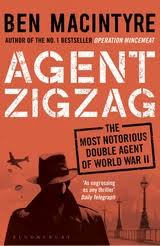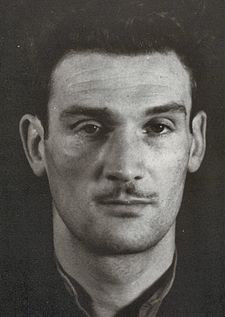More Exciting Than Fiction
One of the most entertaining history books I have read in ages, Ben McIntyre’s Agent Zigzag: A True Story of Nazi Love, Espionage, and Betrayal beggars belief. It’s too exciting to be true. But it is – it really happened. McIntyre is a thoughtful and careful writer. It is not at all surprising that the book is being made into a movie (again) and that Tom Hanks is a producer. The story leaps from the page.
Agent Zigzag is about Eddie Chapman, an English crook, spy, rake, and hero. Born in rough circumstances with little love or structure at home, Eddie ran with a fast crowd. Smart but with little appetite for school, he was in and out of trouble throughout his teens. A short stint in the military was not to his liking. By his twenties, Eddie had done jail time and made friends with other criminals keen on robbery. They innovated, using gelignite to explode safes, and Eddie had plenty of money to spend on clothes, trips, fast cars and women. Women fell for Eddie and he professed deep love and affection for more than a few (and more than one at the same time, too).
Eventually recaptured and imprisoned in Jersey, a Channel Island, Chapman was doing time for his crimes when World War II broke out. Jersey was captured by the Germans. They did not know what to make of this criminal. Chapman was an avid reader, had schooled himself in many of the classics, and was also good with languages – eventually fluent in French with good skills in German. Chapman wanted out of jail and sensed an opportunity. Faking anger at the British for imprisoning him, Chapman talked the Germans into using him as a spy. After many months of training, tests, and more training, he parachuted back to England with a mission of sabotage.
Chapman immediately turned himself over to the British military and offered to spy against the Germans. After more tests, more training and enough subterfuge for several movies, the British and Chapman faked the destruction of an aircraft factory – supposedly blown up by Chapman. Camouflage and clues were enough to fool the Germans. Chapman made his way back to occupied mainland Europe and was received as a hero by his German handlers. The Germans gave him more money and he was even awarded an Iron Cross. He faced incredible risks – and seemed to thrive on the challenge.
 Chapman did more pseudo-espionage for the Germans, in Norway and Portugal, all the while feeding information to the British. He also started a relationship with a women who was part of the Norwegian resistance (while engaged to a different woman in England). His life during the war was one of ongoing risk and derring-do – with the occasionally felony on the side. Throughout it all, Chapman charmed people of all nationalities. He was amoral and patriotic, fearless and engaging.
Chapman did more pseudo-espionage for the Germans, in Norway and Portugal, all the while feeding information to the British. He also started a relationship with a women who was part of the Norwegian resistance (while engaged to a different woman in England). His life during the war was one of ongoing risk and derring-do – with the occasionally felony on the side. Throughout it all, Chapman charmed people of all nationalities. He was amoral and patriotic, fearless and engaging.
British intelligence cut Chapman loose towards the end of 1944. He was too much of a risk. In post-war years Eddie consorted with people from all walks of like – including criminals – and even befriended his old German spy handler. Several times, Chapman tried to share his story. Full accounts were squashed by the British government, though fictional versions appeared in print and on the screen. The 1966 movie Triple Cross was based on Chapman’s exploits. Eddie eventually died in 1997.
I couldn’t put down Agent Zigzag – it’s as good, if not better, than any potboiler at the bookstore. Truth sometimes is much more entertaining than fiction.
David Potash